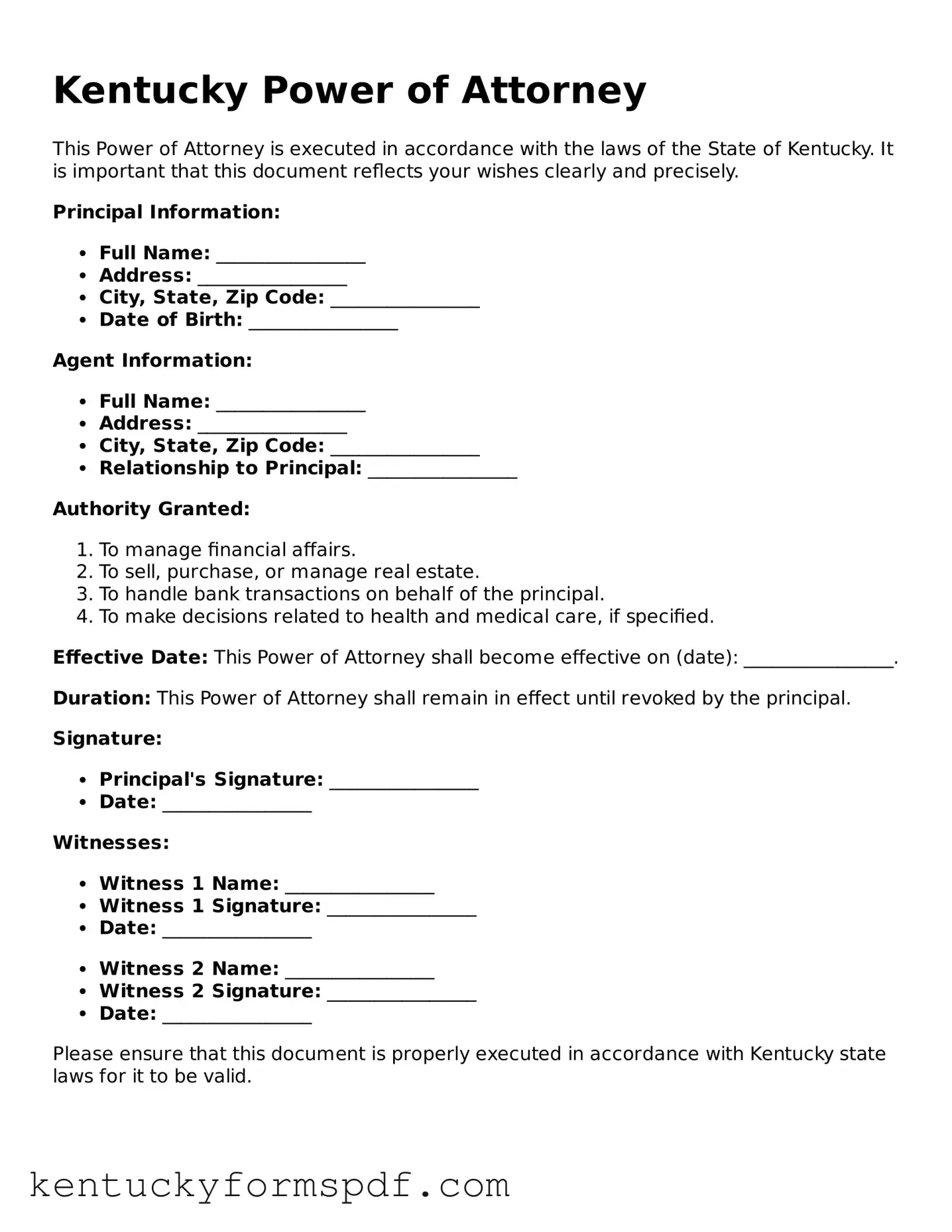What is a Power of Attorney in Kentucky?
A Power of Attorney (POA) in Kentucky is a legal document that allows one person, known as the principal, to appoint another person, called the agent or attorney-in-fact, to make decisions on their behalf. This can include financial matters, healthcare decisions, or other personal affairs. The authority granted can be broad or limited, depending on the principal's wishes.
What types of Power of Attorney are available in Kentucky?
In Kentucky, there are several types of Power of Attorney. The most common include the General Power of Attorney, which grants broad powers to the agent; the Durable Power of Attorney, which remains effective even if the principal becomes incapacitated; and the Medical Power of Attorney, which specifically allows the agent to make healthcare decisions for the principal. Each type serves different needs and situations.
How do I create a Power of Attorney in Kentucky?
To create a Power of Attorney in Kentucky, you must be at least 18 years old and of sound mind. The document should clearly state your intentions, identify the agent, and outline the powers granted. While it is not required to have a lawyer, consulting one can ensure that the document meets all legal requirements. The POA must be signed in the presence of a notary public or two witnesses to be valid.
Can I revoke a Power of Attorney in Kentucky?
Yes, you can revoke a Power of Attorney in Kentucky at any time, as long as you are competent. To revoke, you should create a written notice stating your intention to revoke the POA. It is advisable to notify your agent and any institutions or individuals that may have relied on the original document. This helps prevent any confusion or misuse of authority.
What happens if the principal becomes incapacitated?
If the principal becomes incapacitated, a Durable Power of Attorney remains effective, allowing the agent to continue making decisions. However, if the POA is not durable, it will cease to be valid upon the principal's incapacity. It is crucial to consider this when creating a POA, especially for long-term planning.
Can I specify limitations on my agent's authority?
Yes, you can specify limitations on your agent's authority in the Power of Attorney document. You might choose to restrict certain powers or outline specific conditions under which the agent can act. Clear communication of your wishes is essential to ensure that your agent understands their responsibilities and limitations.
Is a Power of Attorney valid if I move to another state?
A Power of Attorney created in Kentucky is generally valid in other states, but some states may have different requirements for validity. It is advisable to check the laws of the state you are moving to and, if necessary, create a new Power of Attorney that complies with that state's requirements. This helps avoid any potential legal complications.
What should I do if my agent is not acting in my best interest?
If you believe your agent is not acting in your best interest, you have several options. You can revoke the Power of Attorney if you are still competent. If you are incapacitated, you may need to seek legal assistance to challenge the agent’s actions or to have them removed. It is important to act quickly to protect your interests.
Do I need a lawyer to create a Power of Attorney in Kentucky?
While you do not need a lawyer to create a Power of Attorney in Kentucky, having one can be beneficial. A lawyer can help ensure that the document is properly drafted, complies with state laws, and accurately reflects your wishes. This can prevent potential issues or misunderstandings in the future.
What is the cost associated with creating a Power of Attorney?
The cost of creating a Power of Attorney can vary widely. If you choose to draft the document yourself using templates, it may be minimal or free. However, if you hire a lawyer, fees can range from a few hundred dollars to more, depending on the complexity of your needs. It is wise to consider the potential benefits of professional assistance when making this important decision.

